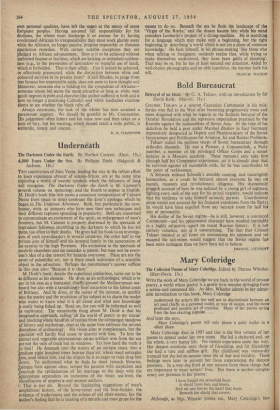Bold Bureaucrat
Betrayal of an Ideal. By G. A. Tokaev, with an introduction by Sir David Kelly. (Harvill. 21s.) COLONEL TOKAEV is a veteran Caucasian Communist in his mid- forties who fled to the West after becoming progressively more and more disgusted with what he regards as the Stalinist betrayal of the October Revolution and the repressive imperialism practised by the Kremlin against the nationalities of Soviet Asia. At the time of his defection he held a post under Marshal Zhukov in East Germany impressively designated as Deputy and Plenipotentiary of the Soviet
• Government and Politbureau for Aviation, Jet and Rocket Problems. Tokaev scaled the perilous steeps of Soviet bureaucracy through orthodox channels. He was a Pioneer, a Consomolnik, a Party member, a member of the privileged Officer Corps and a senior lecturer in a Moscow academy. These memoirs only take him through half his Communist experiences, yet it is already' clear that he survived against all reasonable odds, for he was unorthodox to the point of recklessness.
A Schweik without Schweik's amiable cunning, and incorrigibly humourless, as a youth he lectured almost everyone he met on morals, manners and revolutionary, diligence. His shamelessly priggish account of how he was seduced by a young girl of eighteen, fighting every inch of the way for his prized virginity, would indicate that the tendency to take himself seriously persists. Unorthodoxy alone.would not account for his frequent expulsions from the Party; he would have been expelled from any barrack room for half his sins of personality.
His dislike of the Soviet regime—he is still, however, a convinced Communist—and his opinionated character have resulted inevitably in a highly subjective report on recent Russian history. It is not entirely valueless, nor is it unsurprising. The fact that Colonel Tokaev insisted at all times on announcing his opinions and yet escaped the salt-mines would suggest that the Soviet regime has been more indulgent than we have been led to believe.
EMANUEL L1TVINOFF


































 Previous page
Previous page